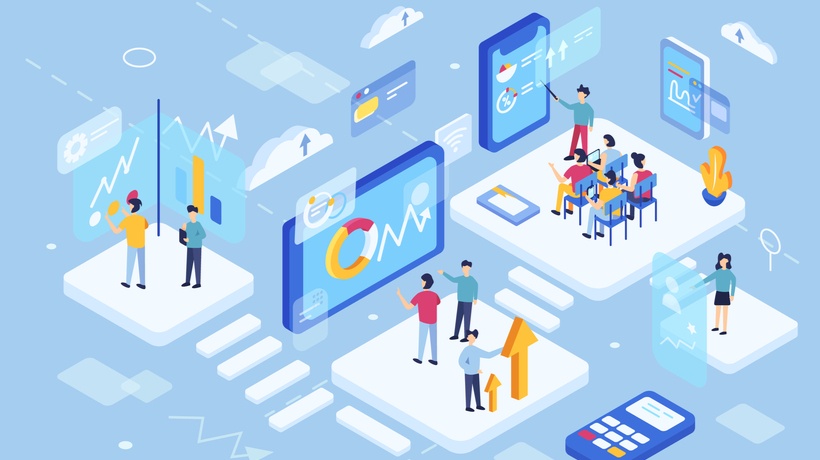Digital Training: Boosting Hotel Efficiency
The hospitality industry continuously evolves and digital training methods serve as a fundamental operational strategy to improve employee performance and customer satisfaction levels. Hotels use modern technological solutions to optimize their workflows, create individualized customer experiences, and keep their competitive position. This analysis focuses on how digital training alters hotel operations while developing ongoing excellence and improvement through culture development.
The Evolution Of Digital Training In Hospitality
The hospitality field now uses modern digital education technology instead of traditional teaching standards. Hotels undergo this transition because they require training solutions that accommodate flexible and scalable approaches to training. The tools incorporated into digital training include eLearning modules, Virtual Reality simulations, and mobile applications that provide staff members with essential skills and knowledge for role excellence.
Advantages Of Digital Training Platforms
- Accessibility and flexibility
Employees can benefit from digital platforms by accessing training materials on their own time which supports schedules that differ between learners. - Consistency in training
Standard digital training materials guarantee that all departments receive standardized instructor interactions which preserves uniform service quality. - Cost-effectiveness
Through digital training methods, organizations minimize both operational costs and their required expenditure on physical resources. - Real-time updates
Digital platforms enable efficient updates with industry practices and regulations to maintain staff compliance.
Enhancing Hotel Staff Efficiency Through Digital Training
Operational effectiveness and staff performance improvement become possible through proper digital training programs.
Streamlining Onboarding Processes
Organizations that implement digital training in their onboarding process speed up employee adaptation by efficiently teaching all necessary policies and procedural and service standards.
Continuous Professional Development
Continuous digital training delivers ongoing educational opportunities that allow personnel to understand industry evolutions, technological upgrades, and changing guest requirements.
Performance Monitoring And Feedback
Most digital training systems feature analytical tools that monitor employee advancement and pinpoint areas needing improvement as well as offer individualized assessment feedback to promote accountable growth.
Elevating Guest Experience Through Technologically Empowered Staff
Proficient staff who were trained to use technological tools provide better capabilities for delivering top-notch guest experiences.
Personalized Guest Interactions
Digital training lets staff properly use customer relationship management (CRM) systems to access guest data which allows them to provide customized services for better satisfaction.
Efficient Issue Resolution
The ability to use digital communication tools strengthens employees' capacity to respond promptly to guest inquiries which results in improved guest satisfaction.
Adoption Of Innovative Technologies
The ability of staff to operate emerging technology solutions, like mobile check-ins, smart room controls, and AI-powered concierge services, enables them to help guests use these systems for better convenience and engagement levels.
Case Studies: Successful Implementation Of Digital Training
Case Study 1: Upskilling Staff With AI Integration
A hotel chain used AI-powered digital educational programs to train its staff to utilize predictive analytics for delivering customized guest benefits. The implementation led to better customer happiness ratings and customers choosing to book again.
Case Study 2: Enhancing Communication With Mobile Technology
Staff received mobile communication devices at another hotel as part of their digital training program. New communication technology systems enabled faster and more efficient staff interaction which brought about improved service capabilities combined with accelerated guest request handling.
Best Practices For Implementing Digital Training In Hotels
- Assess training needs
The organization needs to conduct detailed assessments to identify particular skills deficiencies and required training programs. - Select appropriate platforms
Hotel managers should select digital training tools that correspond to their operational targets and technical systems while catering to employee needs. - Create engaging, interactive content
Interactive multimedia resources, including videos, together with quizzes and simulations, help produce engaging professional training content. - Encourage management support
Establish executive support that promotes continuous growth and investment in learning initiatives for the organization. - Monitor and evaluate effectiveness
Performance metrics must be used along with employee and guest satisfaction surveys to assess digital training effectiveness and relevance.
Overcoming Challenges In Digital Training Implementation
Digital training provides multiple advantages but its deployment requires strategic solutions to handle implementation challenges.
Technological Barriers
Staff success requires all personnel to obtain essential equipment with reliable internet access. To reduce barriers, staff can access user-friendly platforms along with technical support systems.
Resistance To Change
Some members of staff show reluctance toward implementing digital initiatives at work. The implementation of digital training will be more effective when staff members receive clear information about their concerns, see how this training benefits them, and participate actively in system selection.
Maintaining Engagement
Interactive training programs designed for different learning styles and relevance to employees serve as crucial factors in preventing work-related disengagement.
The Future Of Digital Training In Hospitality
Modern hospitality industry development requires digital training to establish workforces with increased competence, adaptability, and technical proficiency. Upcoming technological developments of Virtual Reality (VR) and Augmented Reality (AR) will create immersive training platforms that optimize educational results for participants.
Conclusion
Hotel industry transformation through digital training delivers better staff performance and superior guest service. Hotels will be able to achieve operational efficiency and service quality improvements through technological implementation to maintain industry competitiveness in modern hospitality. This way, hotels can achieve excellence in guest expectations through investments in continuous learning and technological improvements which will produce an adaptable team. To remain competitive, hotels should welcome digital transformation into their hospitality operations.
Frequently Asked Questions (FAQ)
Digital training helps maintain employee retention by offering professional development opportunities that showcase organizational support and create job satisfaction through new skills acquisition.
Absolutely. Digital training adapts to the respective organizational needs of small hotels by using scalable technology to deliver affordable solutions for employee training and business operations.
Hotels measure training effectiveness by tracking employee evaluation results, guest satisfaction data, and survey responses, as well as operational efficiency performance markers. Regular assessment sessions and program updates help maintain training programs that deliver maximum impact.
Learning Management Systems, Virtual Reality simulations, mobile training applications, interactive eLearning courses, and AI-powered chatbots represent the optimal technologies for hotel staff education.
Digital training enables workforce development, which leads to satisfied guests through the staff's ability to deliver custom services, handle problems fast, and manage technological guest service resources. The service quality of well-trained employees results in creating smooth and unforgettable experiences for guests.
The advantages of digital training exist alongside three key risks: technical hurdles, employee resistance, and low engagement. Hotels should address these risks by providing user-friendly platforms, clear communication channels, as well as interactive educational materials.








